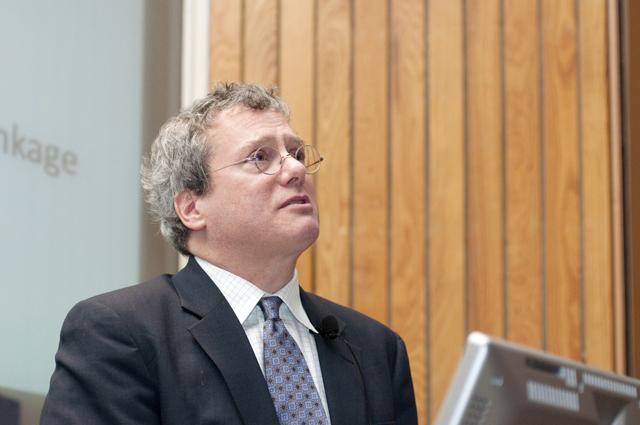Timothy Noah, senior editor of The New Republic, visited campus on Wednesday to discuss the impact of wealth disparity on the 2012 presidential election.
Noah, a Harvard graduate, has written for the Wall Street Journal and Newsweek and authored The Great Divergence, a book about income inequality in the United States.
The lecture took place Wednesday evening at Poe Hall. Noah discussed a number of issues ranging from the cultural and historical context of financial stratification to the negative repercussions it has on society today.
Before discussing the specifics of how wealth disparity influenced the past election, Noah presented an extensive body of statistical evidence and economic terms to establish context.
The great divergence refers to an economic trend from 1979 to the present in which the difference between incomes of the top earners in the U.S. to the rest of the population increased. This time frame is juxtaposed to the period known as the great compression, which started during the Great Depression and lasted until 1978. During this time, the gap between the rich and the poor was decreasing.
This difference in income levels is often measured in terms of the Gini index, which provides a unit for dispersion within a set of data such as income.
Noah informed the audience that although international economic trends have produced an increase in the Gini index, or an increase in income disparity, there have been notable exceptions, particularly in Latin America. This implies that current financial conditions do not necessarily lead to increasing wealth stratification.
Another important term which Noah defined was income mobility. This is the measurement of one’s ability to change their economic status. Noah pointed out that, although the United States has long been considered a country where it is easy to go from rags to riches due to our principles of laissez-faire economics, our ability to do so has fallen far behind that of other countries such as France, Spain, Norway and Finland in recent years.
Noah said the decrease in mobility and the increase in inequality is due to the fact that in recent years, “income growth for top executives is often unrelated to company performance”. He went on to say, “the affluent and wealthy have been prospering where the middle class has not.”
These concepts were relevant to the recent presidential election, according to Noah.
For example, Mitt Romney was among the top income earners who made significantly more than the average American while being taxed at a lower rate than the average American. Noah said that, although Obama admitted “the further the rungs grow apart the harder the ladder is to climb,” he more or less shied away from directly addressing income inequality as a major issue in the election.
Many students were enlightened by Noah’s comments, including Chris Forcinito, a junior in biology.
“Before this presentation, I did not view the wealth gap as a problem in the United States,” Forcinito said.
Much of the information discussed was relevant to students, particularly how the great divergence affects students.
“If tuition keeps increasing at [this] rate…without increased subsidization from the government, college education will become out of the market for most people,” Noah said.








